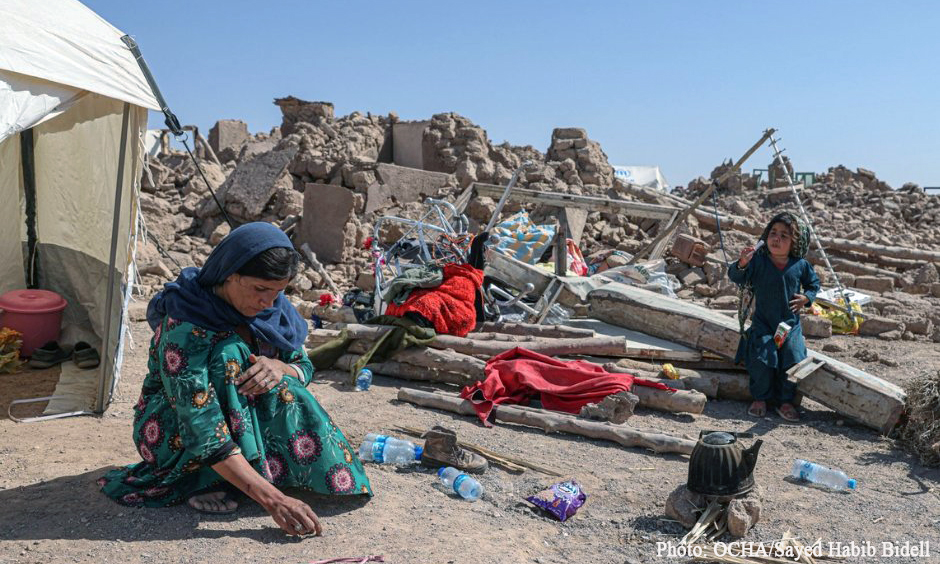Latest News
UNICEF says over 90% of Herat earthquake victims are women and children

The United Nations Children’s Fund (UNICEF) says that more than 90 percent of the victims of this week’s earthquakes in Herat province are women and children.
Aid organizations have said the high casualty toll of women and girls was because of the timing of the first major quake, which happened at 11:11 am on Saturday morning. At that time of the day most village men are out of the house, while women and girls are at home.
In a post on X, on Wednesday, UNICEF also appealed for immediate funding of $20 million to help survivors.
This comes after two 6.3 magnitude quakes on Saturday, followed by a string of strong aftershocks and another 6.3 earthquake Wednesday that was epicentered in Herat but also felt in Farah and Badghis provinces.
Relief operations in Herat continue, while rescue workers continue to look for bodies. On Wednesday, aid organizations said there were over 400 people still missing after Saturday’s disaster.
The United Nations says aid has arrived in the worst-hit areas but that it is not enough.
Stéphane Dujarric, spokesman for the UN Secretary General, said: “I can say that some aid has been distributed, but it is not enough. If you are affected anywhere, no aid can arrive quickly and the current situation of aid delivery is challenging. We have international staff and “they are currently evaluating what they can get from other countries. We currently do not have enough funds and we need help.”
Pope Francis, the leader of the Catholic church, has also appealed to the foreign community to help the earthquake victims.
He said: “I invite all people of good will to help the people of Afghanistan who have suffered after the devastating earthquake.”
The UN has meanwhile said that Wednesday’s earthquake also caused major damage to more than 110 villages. Gulran and Injil districts were impacted. In total, an estimated 17,000 people have been impacted by the earthquakes, leaving thousands of people homeless.
Latest News
Continued aid to Afghanistan vital for regional security: Kazakh president

Kazakhstan’s President Kassym-Jomart Tokayev has emphasized the continuation of humanitarian assistance to Afghanistan, stating that the ongoing provision of such aid plays an important role in ensuring regional security.
Speaking at the international conference “Peace and Trust” in Ashgabat, the capital of Turkmenistan, Tokayev described addressing complex humanitarian challenges and the reconstruction of Afghanistan as a necessity.
“To ensure regional security, we consider it essential to continue providing assistance to Afghanistan, including by strengthening international efforts to address complex humanitarian issues and the reconstruction of this country. Kazakhstan remains committed to supporting the people of Afghanistan through humanitarian aid, educational projects, trade development, and food security initiatives,” he said.
Meanwhile, experts believe that sustainable improvement of the humanitarian situation in Afghanistan requires broad cooperation from the international community and support for the country’s economic development.
“Investment can be defined as one of the fundamental drivers of the economic cycle, and whenever Afghan traders do not take their money out of the country and instead invest domestically, it naturally leads to greater growth and dynamism in Afghanistan’s economy,” said Abdul Zahoor Modabber, an economic analyst.
As the humanitarian crisis in Afghanistan continues, reports by international relief organizations indicate that millions of citizens of the country are in urgent need of food, health, and livelihood assistance.
The reduction in funding for aid organizations, the impacts of climate change, and the return of migrants have increased concerns about a further deterioration of the humanitarian situation in the country.
Latest News
Islamic Emirate declines to attend Tehran meeting on Afghanistan
Latest News
Sirajuddin Haqqani: A government that intimidates its people is not a true government

Khalifa Sirajuddin Haqqani, Minister of Interior of the Islamic Emirate of Afghanistan, said during a visit to Khost province on Friday that any government which rules through fear cannot be considered a true government.
“A government is one that is loved by its people, one that serves them with respect and compassion, and from whose behavior people learn ethics and sincerity,” he said.
Haqqani also stressed that Afghans who opposed the Islamic Emirate in the past should be tolerated and treated in a way that helps eliminate hostility and animosity, paving the way for national cohesion.
-

 Latest News2 days ago
Latest News2 days agoMuttaqi: Afghanistan’s progress requires both religious and modern education
-

 Sport4 days ago
Sport4 days agoILT20: Desert Vipers edge Gulf Giants in historic super over thriller
-

 Regional4 days ago
Regional4 days agoSix Pakistani soldiers killed in TTP attack in Kurram District
-

 Business4 days ago
Business4 days agoTrade bodies warn almost 11,000 Afghan transit containers stuck at Karachi port
-

 World4 days ago
World4 days agoPowerful 7.6 earthquake hits northern Japan, tsunami warnings issued
-

 Latest News3 days ago
Latest News3 days agoTrump calls Afghanistan a ‘hellhole’ country as US expands immigration restrictions
-

 Sport3 days ago
Sport3 days agoCommanding wins for Arman FC and Sarsabz Yashlar in Afghanistan Champions League
-

 Latest News5 days ago
Latest News5 days agoPakistan’s top general calls on IEA to pick between ties with Islamabad or TTP

























